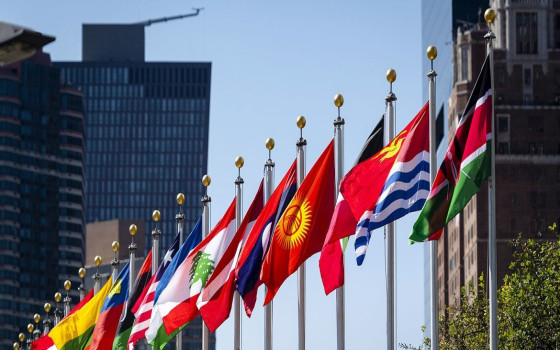
UN: Security Council lacks permanent voice for Africa is unacceptable

- Europe and Arabs
- Tuesday , 13 August 2024 6:53 AM GMT
New York: Europe and the Arabs
UN Secretary-General António Guterres said it is unacceptable that the Security Council, the world’s preeminent peace and security body, lacks a permanent voice for Africa, a continent with a population of more than one billion, a young and rapidly growing population that makes up 28 percent of the UN membership. According to the UN’s daily news bulletin
In his address to a high-level Security Council debate held yesterday, Monday, on “Addressing Historical Injustice and Enhancing Africa’s Effective Representation on the Security Council,” Guterres said, “We also cannot accept that Africa’s views are not adequately appreciated on issues of peace and security, both on the continent and around the world.”
He pointed out that the world has changed since 1945—when the United Nations was established—but the composition of the Council, despite some changes, has not kept pace with this change. He added that in 1945, most African countries were still under colonial rule and had no voice in international affairs, explaining that this led to “a glaring omission that has remained unresolved to this day.”
“Africa is underrepresented in global governance structures, from the Security Council to international financial institutions, but it is overrepresented in the very challenges these structures are designed to address,” Guterres said.
No global security without African security
“There can be no global security without African security,” the UN chief stressed. But he noted that African countries are burdened by crushing debt and underfunding due to the international financial architecture, where they are underrepresented and denied the level of support they need, and are facing severe droughts and floods caused by a climate crisis they did nothing to create.
Amid all this, he explained, Africa has proven itself a willing and able partner for peace, particularly with the United Nations, both on the continent and beyond. He also pointed to the purposeful efforts of African-led forces to restore peace, from Somalia to Lake Chad, from Mozambique to the Democratic Republic of the Congo.
“In times of crisis and geopolitical division, African countries are often among the first to advocate for peace, multilateral solutions and commitment to international law and the United Nations Charter,” Guterres said.
A strategic imperative
The Secretary-General stressed that for different parts of the world to contribute to the work of the Security Council, reform of its membership must be accompanied by democratization of its working methods. He referred to the new peace agenda, which puts forward a number of ideas, including greater burden-sharing among Council members, and calls for improvements and innovations in other parts of the global architecture whose work affects peace and security.
He noted that the agenda had served as a source of information for the negotiations on the Charter for the Future, which will be adopted at the Summit for the Future next month. Guterres stressed that African voices, visions and participation must be influential in the Council’s deliberations and work.
He added: “This is not just a matter of morality and justice. It is also a strategic imperative that can increase the universal acceptance of the Council’s decisions, which will benefit Africa and the world.”
General Assembly engagement
The President of the United Nations General Assembly, Denis Francis, told the Council that the fact that Africa remains grossly underrepresented on the Security Council “is simply wrong, because it offends the principles of equality and inclusion.”
He added that this is contrary to the principle of sovereign equality among States, and calls for “the urgency of reforming this institution to reflect the world as it is now, not as it was nearly 80 years ago.”
He pointed out that our world is immersed in countless challenges, a world that demands that institutions adapt to current realities, and at the scale and pace required to make a meaningful difference in people’s lives. Francis said that peace for Africa is “the key to unleashing its full and extraordinary potential,” adding that during his official visits to the continent, he had seen the consequences of the absence of peace and the importance of the work of the United Nations on the ground.
He stressed that strengthening the role of African countries in addressing global security and development challenges is of paramount importance. He explained that the General Assembly is actively engaged in the issue of Africa’s representation and Security Council reform, in the context of intergovernmental consultations.
The President of the General Assembly said: “It is encouraging that Member States do not deny this historical injustice. We see that momentum is building for change,” noting that the most recent discussions within the framework of intergovernmental consultations supported strengthening Africa’s representation on the Security Council.
He expressed hope that this would have real meaning "to address this historical injustice, and not just empty pledges without action. Because the issue of effective representation of Africa in the Security Council speaks directly to the credibility of the United Nations itself, as an inclusive and democratic organization."












No Comments Found